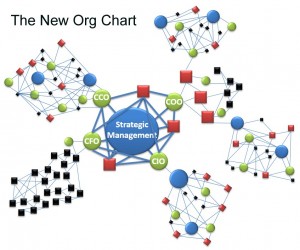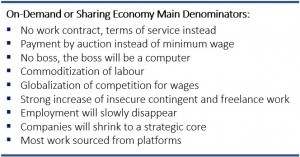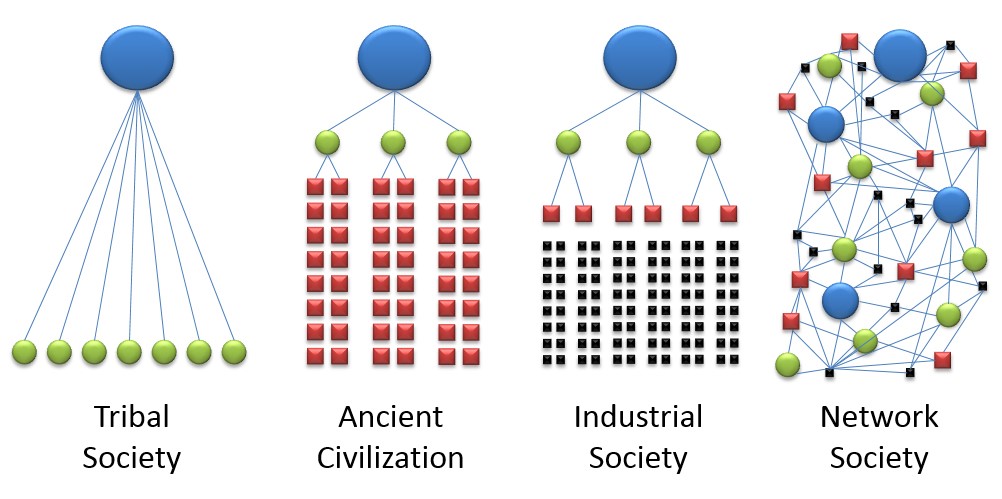The On-Demand Economy provides a preview of where society is going: now and more so in the future typically employed work will be sourced from platforms: graphics design, secretarial services, programming …  Logical consequence will be a strong increase of freelance work. In 2015, in the US more than 40 percent of the workforce were in insecure contingent jobs [1]. Employment is slowly going to erode and companies will shrink to a strategic core of managers who source most work from platforms.
Logical consequence will be a strong increase of freelance work. In 2015, in the US more than 40 percent of the workforce were in insecure contingent jobs [1]. Employment is slowly going to erode and companies will shrink to a strategic core of managers who source most work from platforms.
In addition, such commoditized labour experiences a globalization of competition (unless it’s bound to a site like taxi driving). Crowdworkers (freelancers on platforms) will also not have a work contract, but sign standard terms of service instead. Pay is determined by auction, not by minimum wage and work may be allocated by an algorithm, i.e. the boss is a computer.
Hence we have work ‘above the algorithm’, creating the platforms, and work ‘below the algorithm’ receiving their tasks from platforms [2]. Work above the algorithm tends to program its ideology into the code. The ideology found in a number of on-demand platforms is wage dumping. In Turkers’ (casual for freelancers on Amazon Mechanical Turk) descriptive lingo: “Wage theft is a feature, not a bug“.
We have seen this before: As one era ends and another begins, change occurs at a pace and scale that disrupts all aspects of society.  We are now leaving the industrial era and enter the network society. When, over centuries, ancient civilization morphed into the industrial era, traditional craftsmen were disrupted by early industrialists. Even government was disrupted: monarchies were replaced by republics and democracy. The early industrialists, the ‘Robber Barons’, could amass great wealth in that they owned machinery and factories, giving them the power to dictate work conditions and wages. Then unions formed and re-established balance.
We are now leaving the industrial era and enter the network society. When, over centuries, ancient civilization morphed into the industrial era, traditional craftsmen were disrupted by early industrialists. Even government was disrupted: monarchies were replaced by republics and democracy. The early industrialists, the ‘Robber Barons’, could amass great wealth in that they owned machinery and factories, giving them the power to dictate work conditions and wages. Then unions formed and re-established balance.
Today, people, driven out of regular jobs or not making enough as freelancers compete for tasks that are paid a tiny fraction of any possible minimum wage – several hundred thousands of them on Amazon’s Mechanical Turk platform alone. Just like the last era change, but with one difference: the new ‘Digital Robber Barons’ own data and infrastructure as intermediaries, but not the physical assets needed to deliver the actual service sold. Uber as the largest taxi company in the world doesn’t own one taxi, Airbnb doesn’t own a single apartment and Facebook as the largest media concern doesn’t produce content. The physical assets required to do the job are paid for by the workers.
Business models and the way we work, even government, are ready for disruption again, and maybe this is a chance for millions of people to create work for themselves in a self-responsible manner. Following the thoughts of Angus Deaton this could even enable developing countries to better participate in growth. Mankind has come a long way negotiating and fighting for social standards evolving from the tribal and feudal system and early ‘Robber Barons’. As such, business models are up for disruption, but social achievements have to be safeguarded and even developed further to suit network society. In fact it’s less about humans against robots: the question is more about how humans treat humans.
It may not be too realistic to expect the economy to regulate itself in creating fair working conditions. There is no such evidence in history. Without some kind of unions and a suitable legal framework crowdworkers alone may not be able wrest sustainable conditions for themselves (no such earlier evidence either). The responsibility for a smooth transition of society, preventing upheaval and unrest due to poverty or mass unemployment lies with governments, along with setting the rules for a networked society – and co-creating a vision of how such a future should look like.

Governments could be disrupted by corporations that already operate like platforms and networks – later maybe starting to form corporate states similar to the seasteads (floating cities of likeminded people recognized as a sovereign state) as proposed by Peter Thiel of Paypal. Who knows? Government is under attack at its core: MIT’s John Clippinger is quoted saying “Who needs government?” Currently, governments are confronted with a very powerful private sector and face eroding trust by the population. How to regain this trust and re-enter the arena as a balancing factor vis-a-vis the private sector protecting citizens against eroding social standards? Short: How will government disrupt itself?
Across the historical divide the organisation charts of companies and governments of every era took the shape that society showed as a whole. Currently organisation charts are developing into a networked structure. Therefore, government, too, must interact with networks. This way contact with citizens can be re-established and mutual (!) trust may be regained. Change wouldn’t need to be imposed – it could be co-created. Such results may see better endorsement, too – something that current policies often lack.
Finally, when it comes to co-creating a vision and common understanding of how our future should look like, a book by Jonathan Lear comes to mind: In ‘Radical Hope’ [3] he tells the story of the Crow Indians who were confronted with the extinction of the buffalo – their almost sole source of work and food. They were faced with cultural devastation: The way they used to live for centuries would end. Realizing the desperation and depression of his people, Chief Plenty Coups realised that his nation had to develop a new vision of how they should live and eat in the future. He called this concept ‘Radical Hope’. The economist Lawrence Summers warned that the world currently lacked that kind of political leaders – similar to the ones who helped shape the public policy during the industrial era [4].
The Crow Nation survived. Today it is our generations’ common responsibility to build a future that is inspiring and worth while – not just for a few, but for society as a whole. A strong public sector needs to re-enter the playing field to help build shared prosperity in addition to shared economy.
About the author:
Isabella Mader is Director of the Excellence Institute and university lecturer in the fields of Knowledge Management, Information Science and IT Strategy. 2013 she was awarded “Top CIO of the Year”. Her current research focuses on Network Economy, Communities and the Sharing Economy.
[1] Pofelt, Elaine; Shocker: 40% of Workers Now Have ‘Contingent’ Jobs, Says U.S. Government. Forbes, 25 May 2015. [Online]: http://www.forbes.com/sites/elainepofeldt/2015/05/25/shocker-40-of-workers-now-have-contingent-jobs-says-u-s-government/
[2] Compare: Wing Kosner, Anthony: Google Cabs And Uber Bots Will Challenge Jobs ‘Below The API’. Forbes, 4 February 2015 [Online]: http://www.forbes.com/sites/anthonykosner/2015/02/04/google-cabs-and-uber-bots-will-challenge-jobs-below-the-api/
[3] Lear, Jonathan; Radical Hope – Ethics in the Face of Cultural Devastation. Harvard University Press, 2008.
[4] Hill, Andrew; Divisions emerge over effect of digital disruption. Financial Times, 24 January 2014- [Online]: http://app.ft.com/cms/s/3a7190a2-84df-11e3-8968-00144feab7de.html


As a professor at the Polythecnic University of Valencia (Spain) we are preparing new professionals in the management of information and knowledge. Right now, emerging areas of training (open data, research data or semantic web) agree with the analysis that Dr. Mader states in this post. Now they are no longer frequent stable jobs in a single company. Her analysis (above or below the algorithm) allows us to differentiate the work of the executives (above) from those who will be technical (below) in this new society. Our master degree wants to prepare these new managers, able to handle knowledge and design strategies with the executive level in a globalized and based platforms environment. Master degree on Information management-http://mugi.webs.upv.es
Corporate dictatorship is in fact no better than a traditional dictatorship. In fact, most likely it is worst.
I think that the corporate elite has already become completely crazy, totally separated in their lives and their feelings from the 99,999% of the population. Probably, in their minds, they even feel like a separate (and superior of course) specie.
Most likely the disruption that we really need is one to be applied (merciless) to the corporate elite. Perhaps we need to remember that “common good” are two words to be taken really seriously, not like a joke and that any corporation (or any other institution or organization) that does not contribute to the common good is not useful and must disappear.
Wie wahr, wie wahr.
Super Isa.
Yes!
Cool! I concur!
Like Your article Isabella,
especially Your statement: “In fact it’s less about humans against robots: the question is more about how humans treat humans.”
My perspective to this is: “It’s all a matter of consciousness.”
or more clearly: “Our consciousness matters!” And this is to be taken literally.
I’m really looking forward for Your Part 2 and 3 (on the private and the other on the public sector parts).
For now I am offering work for social workers and educators at more than fair conditions. Hence there are only few well-trained professionals with formal qualifications available on the market they realize their value: Sending their application and CV by e-mail, some even come live to the interview, some prefer Skype. They have a lot of demands which we are willing to fullfill, the binding nature of their commitments seems to lack of liabiliy though. Three out of four cancel the first on-site appointment about one and a half hours before via SMS: “Sorry, just got another offer with even better conditions.” (All “little Amazons” around?)
So maybe it’s not “about humans against robots”, but – still – more about alienation of humans and a loss of feeling for themselves in the community? Alienated humans just acting and to be used like robots? Should there be part of us, having already internalized this mindset not needing any more chip implants?
Not really 🙂 So I’d suggest, it seems to be a multilevel process we’d be better off meditating on once in a while, then step out in the garden, find and hug each other and share good moments in real life 🙂
Tell me Your thoughts.
Good article with excellent idea! I appreciate your post.Regards Sarkari Result
Hi everyone,
thanks so much for all the support for this article.
Thomas, re your question regarding my thoughts on alienated humans in network society: indeed, this is part of my next article speaking about the non-commitment in network society, where we realize that commitment is a mutual concept. If companies are laying off masses of employees to hire them back in as freelancers the answer of those individuals is non-commitment in return.
Hence we learn that commitment doesn’t arise from paying alone. Once we realize that we earn commitment only if we are willing to share it in taking over responsibility and committing ourselves too we will have arrived at a mature understanding of network society: everything is mutual (interestingly enough this seems to be valid for all fields of life).
Governments too will realize that $1 per hour like on Amazon Mechanical Turk and an exhausted population likely won’t make a country thrive and prosper once domestic demand will be driven close to extinction by a poverty stricken population (surprise!).
Network Economy will help everyone involved understand that prosperity comes from sharing – not just the resources but also the gains. I am curious to see whether society will decide to painfully repeat the stretched process of coming to randomly fair terms or whether we decide to learn from history that there’s no way out of establishing a more or less balanced system. So we could do this in a civilized and mature manner instead of falling back into repeating feudal struggles. Neither side can win such a battle. Balance is the only possible outcome. This we can achieve by blood and tears or by behaving in a way that is worthy of a society of the 21st century.
great post
Nice Post